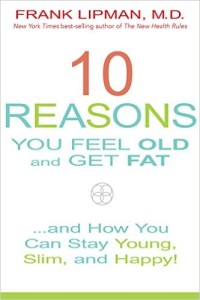
Reviewed by Barbara Morris
 Last month I gave a preview of a book I started to read, 10 Reasons You Feel Old and Get Fat by Frank Lipman, M.D. and I encouraged you to get a copy. That recommendation still stands.
Last month I gave a preview of a book I started to read, 10 Reasons You Feel Old and Get Fat by Frank Lipman, M.D. and I encouraged you to get a copy. That recommendation still stands.
If you have a health issue that defies resolution, either by you or a physician, this book is a “must.” It’s also a “must” for anyone who just wants to know and understand the best course of action to take to feel good and stay healthy.
Dr. Lipman has the ability to clearly explain difficult concepts. He is what I call a “common sense” doctor. There isn’t anything relating to health that he does not cover in abundant detail. Recipes, exercises, diets, medications, supplements, sleep issues, to name a few. He gives the impression that he really cares about helping people and even provides a toll-free number for readers to call a health coach for additional help. (I have called the number and it works.)
If you were to peruse the table of contents you might think, “I’ve seen most of this before.” Don’t be fooled. What’s in each of those chapters is probably significantly different than what you will find in most other books of this kind. Here is the table of contents:
- Reason #1: You’re Not Eating the Right Foods
- Reason #2: You’re Eating Too Many Carbs and Starches
- Reason #3: Your Microbiome Is Out of Whack
- Reason #4: Your Hormones Are Out of Balance
- Reason #5: You Don’t Move Enough
- Reason #6: You’re Stressed!
- Reason #7: You’re Not Getting Enough Sleep
- Reason #8: You’re Overmedicated
- Reason #9: You’re Not Getting Enough Nutrients
- Reason #10: You’re Not Getting Enough “Ubuntu”
Each chapter is important but the two that stand out for me are Reasons #3 and #8.
Reason #3: Your Microbiome Is Out of Whack
Chances are you may be thinking, “What the heck is your microbiome?” Dr. Lipman clearly explains what it is, why it’s important to your health, how antibiotics affect it, how an imbalanced microbiome makes you old and fat, how to protect your microbiome, and so much more that everyone needs to know and understand. Because Dr. Lipman makes everything so easy to understand you won’t feel intimidated by the quantity and depth of information. While reading this chapter you may experience more than a few “aha!” moments that make you aware that how you are living may be contributing to why you are not feeling good and what you can do to get your mojo back.
Reason #8: You’re Overmedicated
In this chapter is Dr. Lipman explains how many prescriptions and over the counter medications cause nutrient depletion. It’s interesting that while the medical profession generally, is quick to pooh-pooh the need for supplements, patients are not warned about medications that cause vitamin depletion. Dr. Lipman provides a chart of 14 commonly prescribed medications, their negative effects and what vitamin deficiency is caused by each.
He has an informative section about the anti-cholesterol statins. He explains why they make you feel old; he gives disturbing facts and negative effects, including the most common side effects being muscle pain and weakness and loss of memory. Bear in mind that the brain needs cholesterol to function properly. Knowing what is known about the potentially harmful effect of statins on the brain, I don’t understand why anyone would not want to try to resolve “bad” cholesterol with dietary intervention before taking a statin.
What to Do
 While working as a pharmacist, it was disturbing to me that more than a few patients took 10 to 15 different meds each day. Sadly, these people often complained how bad they felt. I will never forget Nancy, a very sweet, overweight older woman who obediently picked up her weekly supply of multiple meds. When asked how she was feeling, the answer was usually “I can hardly drag myself around every day.” Equally sad was that over-medicated patients such as Nancy were seen on a regular basis, in the same doctor’s office. Whether seen by the same doctor or a nurse practitioner, someone in the office should have looked at her chart and been aware that maybe, just maybe, some medication changes needed to be made.
While working as a pharmacist, it was disturbing to me that more than a few patients took 10 to 15 different meds each day. Sadly, these people often complained how bad they felt. I will never forget Nancy, a very sweet, overweight older woman who obediently picked up her weekly supply of multiple meds. When asked how she was feeling, the answer was usually “I can hardly drag myself around every day.” Equally sad was that over-medicated patients such as Nancy were seen on a regular basis, in the same doctor’s office. Whether seen by the same doctor or a nurse practitioner, someone in the office should have looked at her chart and been aware that maybe, just maybe, some medication changes needed to be made.
Don’t allow over-medication to happen to you. (Don’t stop taking medications abruptly!) If you are taking more than a couple of different meds each day, perhaps it would be a good idea to ask your doctor 10 questions suggested by Dr. Lipman. Here they are:
 Ten Questions to Ask Your Doctor
Ten Questions to Ask Your Doctor
- What does this medication do?
- Is this drug intended to cure my underlying condition or is it intended to give me relief from my symptoms?
- What are the potential negative effects? Are they minor or major? Common or rare?
- Have long-term studies been done on this drug? Have studies been done for this drug on people like me—my age, my gender, my specific condition? (Remember, many studies are conducted on young or middle-aged men, who often have different responses to medications and to dosages from other populations. Be especially sure to ask this question if you are going to take the drug long term.)
- Do the benefits outweigh the risks?
- Is this medication intended to prevent a problem or treat one?
- What is the evidence that it is actually effective?
- What is the “NNT” for this medication? (You can look it up yourself on thennt.com, usually by drug category [statins] rather than brand name [Lipitor].)
- Are there natural alternatives I might try first?
- I’d like to try natural alternatives first—would you be willing to let me go that route for three more months and then retest me?
If your doctor is annoyed, that’s too bad. Don’t be intimidated. You have a right to satisfactory answers.
Again, get this book, read it, take the information and recommendations seriously and use what you learn to improve the quality of your health and life.
Leave a Reply